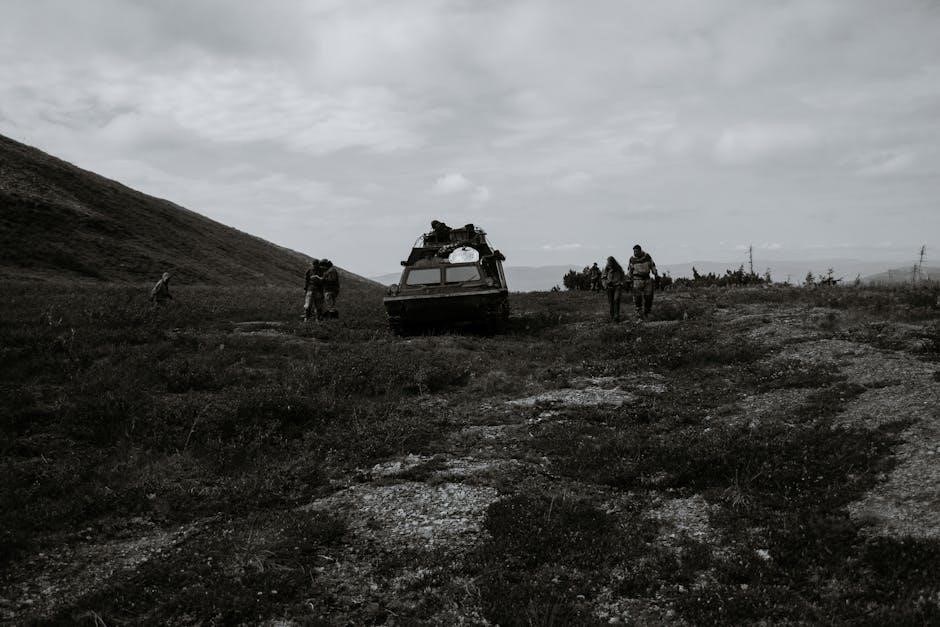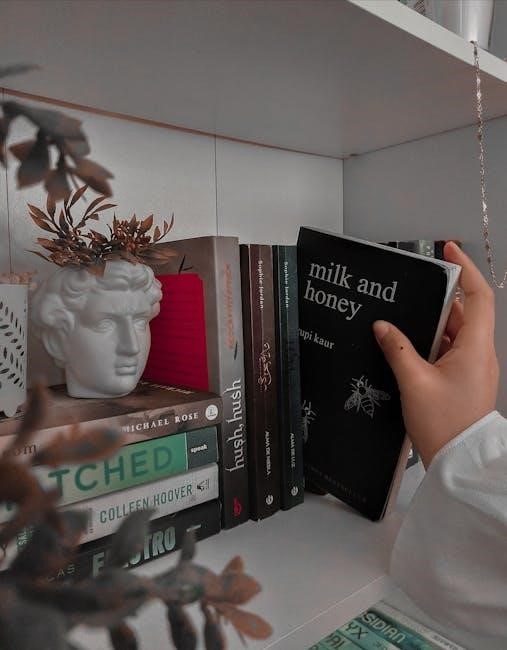The AQA Poetry Anthology: Power and Conflict explores themes of authority, morality, and human struggle through diverse poetic voices, offering insights into societal and personal conflicts across different periods.
Overview of the AQA Anthology
The AQA Poetry Anthology: Power and Conflict is a thoughtfully curated collection of poems that explore themes of authority, control, and human struggle. It features works from renowned poets such as Percy Bysshe Shelley, Robert Browning, and Carol Ann Duffy, spanning various historical periods. The anthology is designed to encourage critical analysis of how power dynamics shape human experiences and societal structures. By examining diverse perspectives, students gain insights into the complexities of conflict and its emotional, moral, and cultural implications, making it a valuable resource for GCSE English Literature studies.
Significance of the Power and Conflict Theme
The Power and Conflict theme is central to understanding human experiences, as it delves into the complexities of authority, control, and resistance. Through diverse poetic voices, the anthology examines how power shapes relationships, societies, and individual identities. By exploring historical and contemporary contexts, the theme reveals the universal relevance of conflict, whether personal, political, or moral. This focus encourages readers to critically analyze how power dynamics influence human behavior and societal structures, making it a compelling and thought-provoking area of study.
Key Themes in the Power and Conflict Anthology
The anthology explores power dynamics, conflict representation, and human nature, examining how authority, control, and resistance shape societal structures and personal identity through poetic expression.
Power Dynamics and Authority
The anthology examines how power is exerted, maintained, and challenged. Poems like Ozymandias and My Last Duchess depict authority figures, revealing both grandeur and corruption. These works highlight the tension between absolute power and human vulnerability, showing how authority can inspire awe yet lead to moral decay. Through diverse perspectives, the poems illustrate the universal struggle for control, emphasizing the transient nature of power and its impact on individuals and societies. This theme remains a cornerstone of the anthology’s exploration.
Conflict and Its Representation
The anthology vividly portrays conflict through poems like War Photographer and Exposure, exploring its emotional and psychological toll. These works depict the brutality of war, personal struggles, and societal clashes, highlighting the human cost of conflict. The poets use vivid imagery and evocative language to convey the intensity and complexity of these experiences, inviting readers to reflect on the universal nature of conflict and its enduring impact on individuals and communities. This theme is central to the anthology’s exploration of human resilience and suffering.
Human Nature and Morality
The anthology delves into the complexities of human nature and morality, presenting characters like the Duke in My Last Duchess and the ruler in Ozymandias. These portrayals reveal themes of ambition, pride, and the corrupting influence of power, while also exploring moral dilemmas and ethical choices. Poets such as Wilfred Owen in Exposure highlight the moral questions surrounding war and its impact on humanity. Through these works, the anthology challenges readers to consider the duality of human behavior and the ethical implications of power and conflict.

Analysis of Specific Poems
The anthology features iconic poems like Ozymandias and My Last Duchess, which explore themes of power, decay, and human morality through vivid imagery and emotional depth.
Ozymandias by Percy Bysshe Shelley
In Ozymandias, Shelley explores themes of power, decay, and the fleeting nature of human achievement. The poem describes a shattered statue of a once-mighty ruler, Ozymandias, with the inscription, “My name is Ozymandias, King of Kings,” contrasting sharply with the desolate landscape. Shelley critiques the arrogance of power, highlighting how even the greatest empires crumble over time. The poem’s central message underscores the transience of power and the inevitability of decline, resonating deeply with the anthology’s focus on power dynamics and human conflict. Its haunting imagery and irony make it a cornerstone of the collection.
My Last Duchess by Robert Browning
Robert Browning’s dramatic monologue, My Last Duchess, examines power, control, and jealousy through the voice of an oppressive Duke. The poem reveals the Duke’s possessive nature as he admires a portrait of his late wife, criticizing her for her perceived lack of gratitude and overly generous smile. Browning masterfully portrays the Duke’s unsettling character, showcasing his abuse of power and emotional conflict. The poem’s chilling tone and psychological depth highlight the destructive consequences of unchecked authority, aligning with the anthology’s exploration of power dynamics and human conflict.

War Photographer by Carol Ann Duffy
Carol Ann Duffy’s War Photographer captures the harrowing reality of conflict through the lens of a photographer returning from a war zone. The poem explores the emotional toll of documenting violence, contrasting the photographer’s detached professionalism with the horror he witnesses. Duffy’s vivid imagery and sensory details, such as the “spools of suffering” and “ghosts,” highlight the moral complexity of recording war. The poem underscores the psychological conflict between objective documentation and personal empathy, reflecting broader themes of power, ethics, and human cost in the anthology.
Historical and Cultural Context
The poems in the AQA Anthology reflect diverse historical periods, from Shelley’s commentary on empire to Browning’s Renaissance-inspired narratives, offering insights into power dynamics shaped by their eras.
Historical Background of the Poems

The poems in the AQA Anthology span various historical periods, reflecting societal norms and political climates. Ozymandias by Percy Bysshe Shelley critiques imperial ambition, drawing inspiration from ancient Egypt’s decline. My Last Duchess by Robert Browning is set in the Renaissance, exploring themes of power and control through a nobleman’s perspective. War Photographer by Carol Ann Duffy addresses modern warfare, highlighting the emotional toll on individuals. These historical contexts enrich the poems’ exploration of power dynamics and human conflict, offering diverse lenses through which to analyze their themes.
Cultural influences significantly shape the AQA Poetry Anthology, with poets drawing from diverse backgrounds and societal norms. War Photographer reflects modern media’s role in warfare, while Ozymandias critiques ancient imperialistic values. The anthology also incorporates female perspectives, offering a balanced view of power dynamics; These cultural elements provide a rich tapestry of voices, allowing readers to explore how societal norms influence representations of power and conflict across different eras and cultures, enhancing the anthology’s relevance and depth in understanding human experiences. The anthology remains highly relevant today, as its exploration of power dynamics and conflict continues to resonate with contemporary societal and political challenges, offering timeless insights. Contemporary audiences interpret the anthology through modern lenses, drawing parallels between historical and current power dynamics. Poems like War Photographer resonate with today’s media-driven conflicts, while Ozymandias critiques authoritarianism, reflecting ongoing struggles with political power. The exploration of human nature and morality in poems like My Last Duchess highlights universal themes of control and manipulation. These works remain relevant, offering insights into societal structures, personal agency, and the emotional toll of conflict, making them vital for understanding modern power struggles and their impact on individuals and communities. The AQA Poetry Anthology remains highly relevant, offering insights into power dynamics and conflict that resonate with contemporary societal issues. Poems like War Photographer and Ozymandias highlight the enduring impact of war and authoritarianism, while My Last Duchess explores toxic power relationships. These themes mirror modern debates on inequality, political corruption, and the human cost of conflict. By examining these works, students gain a deeper understanding of universal struggles, fostering empathy and critical thinking about power imbalances in today’s world. Focus on analyzing themes, motifs, and language techniques in each poem. Use study guides and online resources to deepen understanding. Practice essay writing to refine arguments. To analyze the poems effectively, focus on identifying key themes such as power dynamics, conflict, and morality. Examine language techniques like metaphors, similes, and imagery to uncover deeper meanings. Consider the historical and cultural contexts that shape the poems’ messages. Consider comparing and contrasting different poets’ perspectives. Regularly practice essay writing to refine your ability to structure arguments clearly. Utilize official AQA study guides and anthologies for comprehensive analysis of each poem. Online resources, such as video tutorials and interactive study aids, provide detailed insights. Practice past exam papers to familiarize yourself with question formats. Join study groups or forums to discuss interpretations and strategies. Regularly review notes and summaries to reinforce understanding. Additionally, use flashcards to memorize key quotes and themes, enhancing your ability to reference them in essays. The AQA Poetry Anthology: Power and Conflict offers profound insights into human experiences, exploring themes of authority, morality, and emotional turmoil through historical and cultural lenses. The AQA Poetry Anthology: Power and Conflict explores themes of power dynamics, moral dilemmas, and human nature through a diverse range of poetic voices. Poems like Ozymandias, My Last Duchess, and War Photographer examine authority, control, and the consequences of conflict. Historical and cultural contexts enrich the anthology, offering insights into societal structures and personal struggles. The collection remains relevant today, prompting reflections on contemporary power struggles and ethical issues. Studying these poems enhances understanding of how literature reflects and critiques human experiences, making it a valuable resource for exploring complex themes. The AQA Poetry Anthology: Power and Conflict leaves a lasting impact by challenging readers to reflect on power structures, moral dilemmas, and human nature. Through timeless works by poets like Shelley, Browning, and Duffy, it bridges historical contexts with contemporary issues, fostering empathy and critical thinking. This collection not only aids academic analysis but also encourages deeper engagement with societal norms and personal values, making it a powerful tool for understanding human experiences across generations.Cultural Influences on the Anthology
Modern Relevance and Interpretation

Contemporary Perspectives on Power and Conflict

Relevance of the Anthology in Today’s Society

Study Tips and Revision Strategies
Effective Ways to Analyze the Poems
Revision Resources and Study Guides

Final Thoughts on the Anthology’s Impact